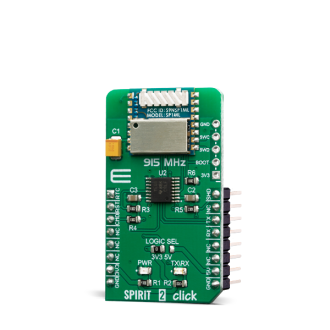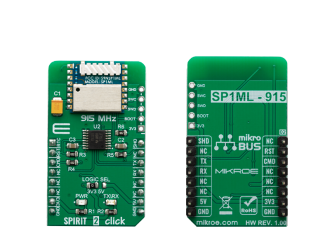
We strongly encourage users to use Package manager for sharing their code on Libstock website, because it boosts your efficiency and leaves the end user with no room for error. [more info]

Rating:
Author: MIKROE
Last Updated: 2019-06-26
Package Version: 1.0.0.0
mikroSDK Library: 1.0.0.0
Category: Sub-1 GHz Transceivers
Downloaded: 4572 times
Not followed.
License: MIT license
Spirit 2 Click features the SP1ML-915, an ultra-low power, fully integrated RF module, which operates at 915 MHz ISM band.
Do you want to subscribe in order to receive notifications regarding "Spirit 2 click" changes.
Do you want to unsubscribe in order to stop receiving notifications regarding "Spirit 2 click" changes.
Do you want to report abuse regarding "Spirit 2 click".


Library Description
The library contains all the necessary functions for working with SPIRIT modules. Generic parser
Key functions:
spirit2_cmdSingle - Sends provided command to the module.spirit2_moduleReset - Reset module.spirit2_modulePower - Turn on module.Examples description
The application is composed of the three sections :
void applicationTask()
{
spirit2_process();
if( _userAppMode == _SPIRIT2_APP_TX_MODE)
{
mikrobus_logWrite("** SPIRIT SENDS MESSAGE.....", _LOG_LINE);
spirit2_cmdSingle(&_txBuffer[0]);
Delay_ms( 2000 );
}
}
Additional Functions :
All additional functions such as timer initialization and default handler.
Other mikroE Libraries used in the example:
StringConversionUARTDepending on the development board you are using, you may need USB UART click, USB UART 2 click or RS232 click to connect to your PC, for development systems with no UART to USB interface available on the board. The terminal available in all MikroElektronika compilers, or any other terminal application of your choice, can be used to read the message.